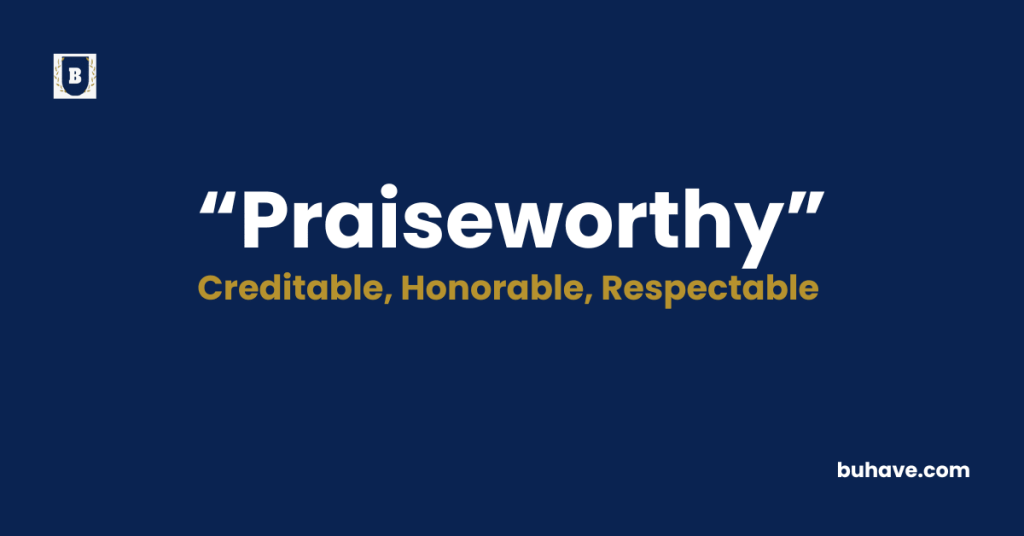The word ‘Praiseworthy ‘ (Adjective) describes actions, behaviors, or qualities that are deserving of admiration, approval, or recognition. in this guide, you’ll learn the full definition, synonyms, antonyms, etymology, and real-life examples of how to use ‘Praiseworthy’ correctly in sentences.
Praiseworthy Explained in Depth
A complete and detailed guide to the words Praiseworthy including meaning, definition, examples, etymology, synonyms, and antonyms.
Meanings of Praiseworthy
Praiseworthy means that someone or something truly deserves admiration, approval, or recognition because of their good qualities, actions, or achievements. To explain it more clearly, when a person does something honorable, kind, or impressive like helping others without expecting anything in return or working hard to reach a goal people naturally feel the urge to praise or compliment them.
Therefore, we call that kind of behavior or effort praiseworthy. In everyday life, this word helps us highlight what genuinely deserves positive attention and respect.
Definition:
Praiseworthy, when explained in clear human language, refers to something or someone that truly deserves admiration or approval because of good actions, noble intentions, or positive qualities. Rather than being ordinary or average, a praiseworthy person or deed stands out due to its meaningful impact or moral excellence. In other words, when someone goes beyond expectations in a thoughtful, kind, or courageous way, others naturally feel encouraged to praise and appreciate their efforts.
Therefore, calling something praiseworthy means recognizing it as valuable and worthy of sincere respect.
Etymology:
The word “praiseworthy” grew naturally from two simple, powerful ideas. First, it combines “praise,” meaning to express approval or admiration, and “worthy,” meaning deserving or having value. Originally, “praise” comes from the Latin word “pretium,” which means “price” or “value,” showing that praising someone was like recognizing their true worth.
Meanwhile, “worthy” developed from Old English “weorþ,” meaning “valuable” or “important.” As time passed, English speakers started combining words creatively to describe people or actions that deserved admiration, and so “praiseworthy” took shape. By the 15th century, people regularly used “praiseworthy” to talk about noble deeds, good character, and admirable efforts. Today, when we say something is praiseworthy, we continue the old tradition of celebrating true value and honor through our words.
Example Sentences:
- Moreover, her dedication to helping others was truly praiseworthy.
- Although the task was difficult, his persistence was praiseworthy.
- Ultimately, their efforts to clean the environment were seen as it by the community.
Praiseworthy Synonyms:
- Admirable
- Commendable
- Laudable
- Honorable
- Noteworthy
- Meritorious
- Creditworthy
- Esteemed
- Respectable
- Exemplary
Praiseworthy Antonyms:
- Blameworthy
- Disgraceful
- Shameful
- Dishonorable
- Reprehensible
- Unworthy
- Deplorable
- Scandalous
- Uncommendable
- Ignoble
FAQs about Praiseworthy
Here are some FAQs (Frequently Asked Questions) about the word Praiseworthy:
1. What does praiseworthy mean in simple terms?
It means something or someone truly deserves praise, admiration, or approval because of good actions, qualities, or achievements.
2. Can praiseworthy describe both people and things?
Yes, definitely. You can describe a person, action, idea, or even a performance as praiseworthy—for example, a praiseworthy act of kindness or a praiseworthy piece of art.
3. Is praiseworthy a positive word?
Absolutely. It carries a strong positive connotation, as it highlights things that are commendable or admirable.
4. Are there any common synonyms for praiseworthy?
Yes, some common synonyms include: admirable, commendable, noble, laudable, and honorable.
5. What are antonyms of praiseworthy?
Some antonyms are: blameworthy, disgraceful, shameful, or unworthy.
6. Can praiseworthy be used in formal writing?
Yes, it’s perfectly appropriate for formal writing, speeches, academic essays, and also fits well in everyday conversation.
Read more p words:

















